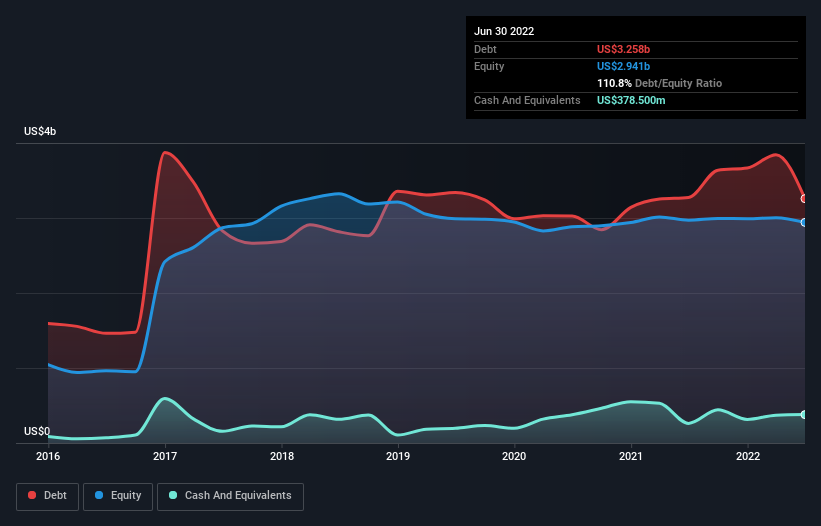- United States
- /
- Entertainment
- /
- NYSE:LGF.A
These 4 Measures Indicate That Lions Gate Entertainment (NYSE:LGF.A) Is Using Debt In A Risky Way

Legendary fund manager Li Lu (who Charlie Munger backed) once said, 'The biggest investment risk is not the volatility of prices, but whether you will suffer a permanent loss of capital.' So it might be obvious that you need to consider debt, when you think about how risky any given stock is, because too much debt can sink a company. We can see that Lions Gate Entertainment Corp. (NYSE:LGF.A) does use debt in its business. But the real question is whether this debt is making the company risky.
Why Does Debt Bring Risk?
Generally speaking, debt only becomes a real problem when a company can't easily pay it off, either by raising capital or with its own cash flow. Part and parcel of capitalism is the process of 'creative destruction' where failed businesses are mercilessly liquidated by their bankers. However, a more common (but still painful) scenario is that it has to raise new equity capital at a low price, thus permanently diluting shareholders. Of course, plenty of companies use debt to fund growth, without any negative consequences. When we examine debt levels, we first consider both cash and debt levels, together.
See our latest analysis for Lions Gate Entertainment
What Is Lions Gate Entertainment's Debt?
The chart below, which you can click on for greater detail, shows that Lions Gate Entertainment had US$3.26b in debt in June 2022; about the same as the year before. On the flip side, it has US$378.5m in cash leading to net debt of about US$2.88b.

How Healthy Is Lions Gate Entertainment's Balance Sheet?
According to the last reported balance sheet, Lions Gate Entertainment had liabilities of US$2.34b due within 12 months, and liabilities of US$3.81b due beyond 12 months. Offsetting this, it had US$378.5m in cash and US$579.1m in receivables that were due within 12 months. So it has liabilities totalling US$5.19b more than its cash and near-term receivables, combined.
This deficit casts a shadow over the US$1.71b company, like a colossus towering over mere mortals. So we'd watch its balance sheet closely, without a doubt. After all, Lions Gate Entertainment would likely require a major re-capitalisation if it had to pay its creditors today.
In order to size up a company's debt relative to its earnings, we calculate its net debt divided by its earnings before interest, tax, depreciation, and amortization (EBITDA) and its earnings before interest and tax (EBIT) divided by its interest expense (its interest cover). Thus we consider debt relative to earnings both with and without depreciation and amortization expenses.
Weak interest cover of 0.083 times and a disturbingly high net debt to EBITDA ratio of 10.3 hit our confidence in Lions Gate Entertainment like a one-two punch to the gut. This means we'd consider it to have a heavy debt load. Even worse, Lions Gate Entertainment saw its EBIT tank 91% over the last 12 months. If earnings continue to follow that trajectory, paying off that debt load will be harder than convincing us to run a marathon in the rain. When analysing debt levels, the balance sheet is the obvious place to start. But it is future earnings, more than anything, that will determine Lions Gate Entertainment's ability to maintain a healthy balance sheet going forward. So if you're focused on the future you can check out this free report showing analyst profit forecasts.
But our final consideration is also important, because a company cannot pay debt with paper profits; it needs cold hard cash. So we clearly need to look at whether that EBIT is leading to corresponding free cash flow. Over the last three years, Lions Gate Entertainment saw substantial negative free cash flow, in total. While investors are no doubt expecting a reversal of that situation in due course, it clearly does mean its use of debt is more risky.
Our View
On the face of it, Lions Gate Entertainment's EBIT growth rate left us tentative about the stock, and its level of total liabilities was no more enticing than the one empty restaurant on the busiest night of the year. And furthermore, its interest cover also fails to instill confidence. It looks to us like Lions Gate Entertainment carries a significant balance sheet burden. If you play with fire you risk getting burnt, so we'd probably give this stock a wide berth. There's no doubt that we learn most about debt from the balance sheet. However, not all investment risk resides within the balance sheet - far from it. Case in point: We've spotted 1 warning sign for Lions Gate Entertainment you should be aware of.
If, after all that, you're more interested in a fast growing company with a rock-solid balance sheet, then check out our list of net cash growth stocks without delay.
New: AI Stock Screener & Alerts
Our new AI Stock Screener scans the market every day to uncover opportunities.
• Dividend Powerhouses (3%+ Yield)
• Undervalued Small Caps with Insider Buying
• High growth Tech and AI Companies
Or build your own from over 50 metrics.
Have feedback on this article? Concerned about the content? Get in touch with us directly. Alternatively, email editorial-team (at) simplywallst.com.
This article by Simply Wall St is general in nature. We provide commentary based on historical data and analyst forecasts only using an unbiased methodology and our articles are not intended to be financial advice. It does not constitute a recommendation to buy or sell any stock, and does not take account of your objectives, or your financial situation. We aim to bring you long-term focused analysis driven by fundamental data. Note that our analysis may not factor in the latest price-sensitive company announcements or qualitative material. Simply Wall St has no position in any stocks mentioned.
About NYSE:LGF.A
Lions Gate Entertainment
Engages in the film, television, subscription, and location-based entertainment businesses in the United States, Canada, and internationally.
Undervalued low.
Similar Companies
Market Insights
Community Narratives



